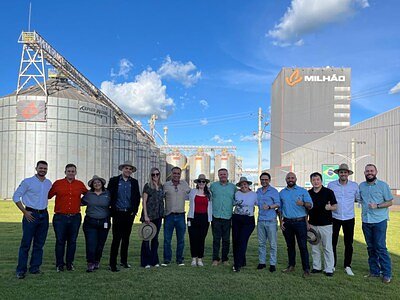
Paying for Progress: PepsiCo's Bold Bet on Regenerative Agriculture in Brazil
A new initiative in Brazil's Cerrado region is pioneering a 'Payment for Outcomes' model, directly incentivizing farmers to adopt practices that restore soil health and build resilience against climate change.
Paying for Progress: PepsiCo's Bold Bet on Regenerative Agriculture in Brazil
By Michelle Bell
BELÉM, BRAZIL – In the heart of Brazil’s Cerrado, a vast tropical savanna crucial for biodiversity and agricultural production, a new approach to sustainable farming is taking root. PepsiCo, in partnership with local organizations, is launching a program that goes beyond traditional sustainability initiatives, directly paying farmers to achieve measurable environmental outcomes. This pioneering ‘Payment for Practice and Outcomes’ model represents a bold bet on regenerative agriculture and a potential blueprint for a more resilient food system.
For decades, the Cerrado has faced increasing pressure from agricultural expansion, particularly for soybean and corn production. Deforestation rates remain alarmingly high, contributing to biodiversity loss and impacting critical carbon sinks. While certifications and sustainable sourcing initiatives have gained traction, many argue they haven't gone far enough to address the root causes of environmental degradation.
“The Cerrado is a critical biome, and we’re at a tipping point,” says an agricultural analyst familiar with the region. “Traditional approaches haven’t adequately incentivized farmers to prioritize long-term ecological health. This new program aims to change that.”
Rewarding Results, Not Just Promises
The initiative, announced this week, focuses on providing financial incentives to farmers who implement practices known to improve soil health, reduce water usage, and enhance biodiversity. Unlike conventional subsidy programs, payments aren’t tied to simply adopting certain practices, but to demonstrably achieving positive environmental outcomes.
“We’re moving beyond just checking boxes,” explains a PepsiCo spokesperson. “We’re measuring the impact of these practices on key indicators like soil organic carbon, water infiltration, and species diversity. Farmers are rewarded based on the improvements they achieve.”
This ‘Payment for Outcomes’ approach tackles a key challenge in sustainable agriculture: the difficulty of verifying and quantifying environmental benefits. The program employs a rigorous monitoring and verification system, leveraging satellite imagery, on-the-ground assessments, and data analytics to track progress and ensure accountability.
A Shift in the Financial Landscape
The financial mechanics of the program are particularly noteworthy. Farmers receive upfront payments to cover the costs of transitioning to regenerative practices, such as cover cropping, no-till farming, and agroforestry. Additional payments are made based on verified improvements in key environmental indicators. This creates a direct financial link between sustainable practices and farmer income, incentivizing long-term commitment.
“It’s a game-changer,” says an agricultural economist following the program. “Farmers have historically been risk-averse when it comes to adopting new practices. This program de-risks the transition by providing financial support and rewarding success.”
The initiative builds on the growing momentum behind ecosystem service markets, where landowners are compensated for providing environmental benefits. However, it goes beyond simply valuing carbon sequestration or water purification. It encompasses a broader range of ecological indicators and recognizes the interconnectedness of soil health, biodiversity, and climate resilience.
Scaling the Impact: Challenges and Opportunities
While the program holds significant promise, several challenges remain. Scaling up the initiative to encompass a larger area and a greater number of farmers will require substantial investment and logistical coordination. Ensuring the long-term sustainability of the program will also necessitate ongoing monitoring, verification, and financial support.
“One of the biggest hurdles will be data collection and verification,” says an environmental scientist involved in the program. “Accurately measuring environmental improvements requires robust monitoring systems and skilled personnel.”
Furthermore, the success of the program hinges on fostering collaboration among farmers, government agencies, and private sector stakeholders. Building trust and ensuring equitable access to resources will be crucial for maximizing impact.
Despite these challenges, the potential benefits of regenerative agriculture are substantial. Improved soil health can enhance crop yields, reduce reliance on synthetic fertilizers, and increase resilience to drought and extreme weather events. Enhanced biodiversity can support ecosystem services and contribute to long-term ecological stability.
“This isn’t just about protecting the environment; it’s about securing the future of food production,” says an anonymous farmer participating in the program. “We need to move beyond extractive agriculture and embrace practices that regenerate the land.”
The PepsiCo initiative represents a significant step in that direction. By directly rewarding farmers for achieving measurable environmental outcomes, the program is demonstrating that sustainability can be both ecologically sound and economically viable. If successful, it could pave the way for a more resilient, equitable, and sustainable food system, not just in Brazil, but around the world. The program’s expansion, coupled with similar initiatives, could signal a pivotal shift in agricultural practices—one that prioritizes long-term ecological health alongside short-term economic gains, offering a beacon of hope for the future of farming in a changing climate. The early results are promising, and the industry will be watching closely to see if this bold bet on regenerative agriculture pays off.
